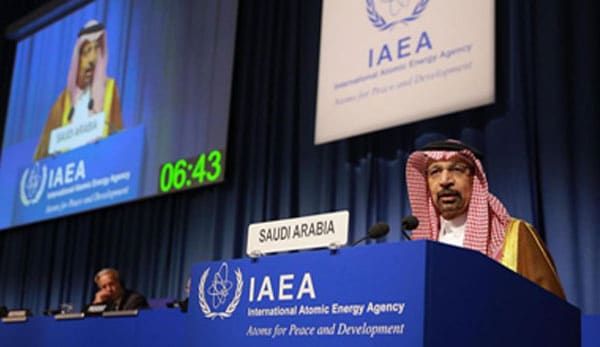Nuclear power’s weapons link: Cause to limit, not boost exports
By Victor Gilinsky, Henry Sokolski | September 20, 2018
 Khalid A. Al-Falih, Saudi Arabia's Minister of Energy, Industry and Mineral Resources, met with US Energy Secretary Rick Perry last year to discuss a US-Saudi nuclear cooperation agreement.
Khalid A. Al-Falih, Saudi Arabia's Minister of Energy, Industry and Mineral Resources, met with US Energy Secretary Rick Perry last year to discuss a US-Saudi nuclear cooperation agreement.
The criticism that supporters of US nuclear exports have found most difficult to counter has been that their wares give an importing country a big leg up on getting a bomb. For decades the exporters’ response has been to pretend this was not so. Now comes Michael Shellenberger, a prominent nuclear power advocate, who casts all this aside. Yes, he writes, there is a strong link between nuclear electricity and weapons, and in fact most countries that built nuclear power plants did so with weapons at least partly in mind. But this is not so much a confession as a sales pitch. He thinks the weapons potential of nuclear power plants actually prevents war—the weapons shadow cast by nuclear plants itself deters enemies—and that this attribute should be exploited as a sales advantage by US nuclear exporters.
Shellenberger’s assessment of the nuclear power-weapons link is important rhetorically because it comes from the nuclear side of the house. He has been celebrated by the nuclear industry and the conservative press as one of the new breed, “pro-technology,” environmental activists who joined the nuclear ranks and are not afraid to do battle with their colleagues over nuclear power. So, his admission about the closeness of civilian and military nuclear technology—realistically what lawyers call a declaration against interest—carries a certain weight and may convince people who have up to now resisted the notion.
But Shellenberger goes on. He was always a bit unrestrained in his advocacy of nuclear power, and in speaking of nuclear weapons he surpasses himself. In an earlier piece, he presents an anecdotal case on why nuclear weapons were a cure-all for world conflict.
He said if only “weak” France had nuclear weapons in 1940 then “strong” Germany would not have attacked. But what if Germany was the one with the bomb?
He also points to India and Pakistan: They had three large wars before they armed themselves with nuclear weapons but none afterwards, only “border skirmishes” with relatively low casualties. And if such conflicts got out of hand and led to nuclear weapon use, well, not to worry—Shellenberger cites an academic “expert” who claims that the nuclear conflict would surely be contained at the “tactical” level. In truth, of course, no one has any idea.
That the presence of nuclear weapons has reduced the frequency of war is an arguable proposition. But one only has to consider the experience of the Cuban Missile Crisis to realize it comes at the price of gambling on nuclear war. Most people have forgotten about them, but our nuclear forces are still on alert, and their use is not ruled out. The “experts” speak of deployment for deterrence only, but deterrence is predicated on use in certain circumstances.
All these inescapable uncertainties apparently got swept away in Shellenberger’s mind by the “Eureka” moment he describes in the latest article: Based on a paper by a couple of political science professors, he asserts that a nuclear power program itself provides a significant level of “deterrence-related” benefits—“a bomb isn’t even required.” He says that when he thought of this, he almost fell off his chair. Why, he wondered, was this fact “not being promoted as one of nuclear power’s many benefits?”
One reason is that it’s a ridiculous proposal based on half-baked ideas.
But there is a serious side to this too. Unfortunately, his views, foolish as they are, are not so different from primitive views privately held in high official and semi-official nuclear circles. It is useful to bring them out of hiding, and we have to thank Shellenberger for that.
Take the Bush Administration’s 2005 nuclear deal with India. It tore a gaping hole in the Non-Proliferation Treaty and yet was described as promoting nonproliferation. Is there anyone so foolish as to believe that hypocrisy? Or to doubt that India’s interest in the arrangement was mainly fortifying its nuclear weapons? And wasn’t the notion of supporting India as a strategic foil to China at the core of US interest?
Consider also the current administration’s efforts to negotiate a nuclear agreement with Saudi Arabia to facilitate nuclear exports to that country. One doesn’t even have to speculate about the Saudis’ interest in bombs—the Crown Prince famously made that clear. And from the US side, it is also clear that a reason to put nuclear technology in the hands of the Saudis is to frighten Iran.
The immediate nuclear issue now is what controls, if any, our government should impose on the proposed US-Saudi nuclear cooperative agreement. The sensible course from the security point of view, which Secretary of State Pompeo has publicly backed, is to make sure Saudi Arabia will not have the capacity to produce nuclear explosives—a controlling condition called the gold standard. But the Saudis are pushing back on that—for obvious reasons—and their supporters in the administration would like to relax the export controls that would apply, in part to get the business but also to have another stick to shake at Iran.
We should have none of this. It has been settled US policy for decades that we don’t want more countries with nuclear weapons or countries threatening to make them. Where we haven’t been consistent in applying that policy regarding nuclear power exports, we need to make corrections, not by exporting more, but less.
Together, we make the world safer.
The Bulletin elevates expert voices above the noise. But as an independent nonprofit organization, our operations depend on the support of readers like you. Help us continue to deliver quality journalism that holds leaders accountable. Your support of our work at any level is important. In return, we promise our coverage will be understandable, influential, vigilant, solution-oriented, and fair-minded. Together we can make a difference.
Keywords: nuclear energy, nuclear exports
Topics: Analysis, Nuclear Energy, Nuclear Risk, Nuclear Weapons

















Interesting article, but let’s not be too rigid in our thinking about Deterrence doctrine. Did the strategy prevent nuclear holocaust during the Cold War? Possibly, but don’t know. Michael Shellenger argues that it did. Did threat of annihilation lead Moscow to back down in the Cuban missile crisis? Quite possibly. Russia was able to back down. That is the difference between the Cold War and today. We now live in an increasingly unstable and chaotic world, where it is becoming harder to avoid the circumstances that must eventually lead us to global conflict. Deterrence can no longer prevent the scenarios… Read more »
Don’t worry. The nuclear apologists no doubt see themselves as being safe in some expensive bunker, prior to moving to another planet.
Terrific article! Problem is – it is full of common sense. Is anyone in authority – let alone in the Trump administration going to understand common sense? Trump is posing as the great peace-maker, while determinedly selling weapons, and nuclear know how – to anyone who can pay – especially to Saudi Arabia
People who claim nuclear power equals “weapons latency” generally — Shellenberger may be an exception — act as if they found nuclear power much less acceptable than nuclear weapons. There really isn’t such a thing as weapons *non*-latency. The Hiroshima bombing showed that a country can develop these weapons without having any nuclear reactors of any sort, and without testing them before use. Since about 2001 it has been generally known — but it may well have been true before — that the necessary truckload of uranium needed for each Hiroshima-style bomb can be obtained inconspicuously from seawater. All offshore… Read more »